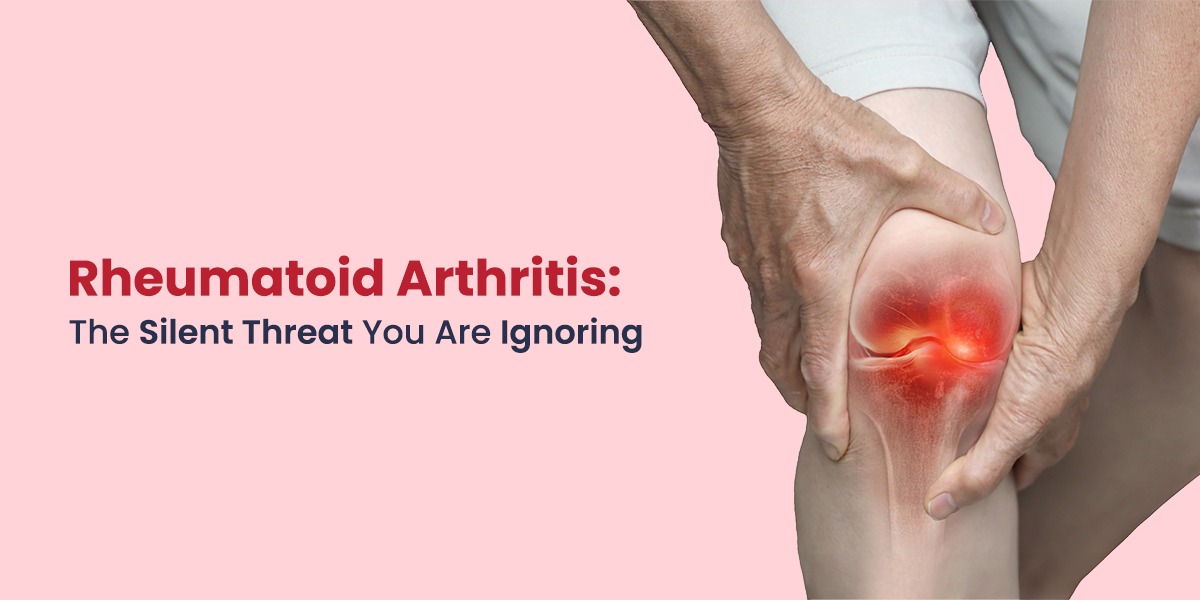Why Rheumatoid Arthritis Might Be More Dangerous Than You Think?

Rheumatoid arthritis is generally considered a joint disease. However, its consequences go far beyond the joints, making it a more dangerous condition than most observers account for. As a systemic autoimmune disease, rheumatoid arthritis causes inflammation and pain in joints. It has repercussions on other organs and organ systems throughout the body.
Let’s discover why rheumatoid arthritis is more dangerous than it currently seems, covering rheumatoid arthritis causes and symptoms. We will also see the importance of early recognition and treatment options.
What is Rheumatoid Arthritis?
Rheumatoid arthritis is mainly characterised by inflammation of the synovial joints, leading to pain and swelling in these joints. The disease usually starts with pain in the small joints of hands and feet, and it can then progress to the larger joints when it cannot be treated easily. Though the first symptoms are seen in the joints, they can affect other parts of the body, including the heart, lungs, kidneys, and skin.
Symptoms of Rheumatoid Arthritis (RA)
Some common rheumatoid arthritis symptoms include:
- Joint Pain
- Swelling
- Stiffness
- Fatigue
- Mild Fever
- Reduced Appetite
Causes of Rheumatoid Arthritis
Some of the common rheumatoid arthritis causes are described below:
- Genetic Factors: Certain genes can predispose an individual to RA, often prominently those concerning the functioning of the immune system, such as the HLA-DRB1 gene. However, not everyone with these genes is affected.
- Environmental Triggers: Environmental factors trigger the genetic predisposition for RA. Major triggers are smoking, infection, and obesity.
- Hormonal Factors: Hormonal factors are also said to play a role in RA since it occurs more in females compared to males. Changes in the hormones, especially estrogen, can manipulate the immune responses and be one of the contributing factors towards RA.
- Periodontal Disease: Emerging evidence shows that gum disease or periodontitis predisposes one to RA. The bacteria associated with periodontal disease may directly affect the immune response that eventually contributes to the inflammation of the joints.
- Age and Sex: Although RA can occur at any age, in most cases, it is diagnosed in adults between 40 and 60 years of age. Women are about two to three times more likely than men to develop RA.
Suggested Read: Is Knee Replacement Right for You? Here’s a Quick Overview
Effects of Rheumatoid Arthritis (RA)
Studies have shown that about 40% of patients with rheumatoid arthritis develop complications affecting other organs, which might significantly affect overall health and quality of life. Here are some effects of rheumatoid arthritis:
- Cardiovascular Complications: Individuals suffering from RA are definitely at high risk for cardiovascular diseases (CVD). The inflammation due to RA triggers the pathway to atherosclerosis, resulting in the retention of plaques in the arteries. This can lead to heart attacks and strokes.
- Pulmonary Issues: lung disease and pulmonary fibrosis are associated with RA. Patients with RA will experience some symptoms in the lungs over time. Chronic inflammation will scar the lung tissue, leading to breathlessness and reduced lung capacity.
- Bone Health: The inflammation occurring with RA causes osteoporosis (a condition of weak bones). The corticosteroids usually prescribed for RA symptoms lead to decreased bone density, which further increases risk.
- Kidney and Liver Damage: Long-term drug treatment often leads to liver and kidney damage. Nonsteroidal anti-inflammatory drugs (NSAIDs) and some disease-modifying antirheumatic drugs (DMARDs) have side effects on organs if they are not properly monitored.
- Anaemia and Fatigue: RA can cause anaemia, with less oxygen-rich iron carried in red blood cells. This creates fatigue, weakness, and a general tiredness or lacking energy in life. The entire quality of life for such patients is further diminished.
Rheumatoid Arthritis Treatment: Key Points
These are some rheumatoid arthritis treatment options commonly used:
- Employ NSAIDs, corticosteroids, DMARDs, Biologic DMARDs, and JAK inhibitors to alleviate symptoms and delay the progression of disease.
- Regular physical activity should be complemented by a diet that contains anti-inflammatory foods and stress management techniques.
- Opt for physical therapy focused on improving mobility and strength, to make day-to-day activities easier.
- Consider surgical methods in severe cases of joint damage, for example, synovectomy or even joint replacement.
Conclusion
Rheumatoid arthritis is not a mere joint disease but a highly complex systemic condition that generally represents high risks to overall health and well-being. The potential for serious complications, particularly as regards the cardiovascular system, warrants increased awareness among both parts of patients and healthcare providers.
If you want an early diagnosis, then consult the best ortho doctor in Lucknow and Kanpur at Regency Healthcare. Their proactive intervention may significantly reduce the extent of these risks, allowing people with RA to live healthier lives and minimise the impact of this chronic condition on their daily activities.

 Call-an-Ambulance
Call-an-Ambulance



